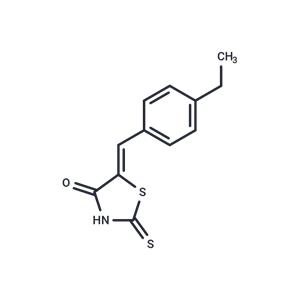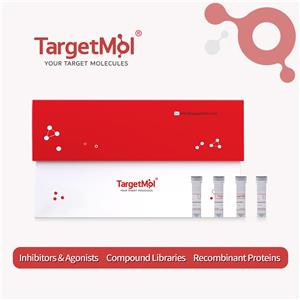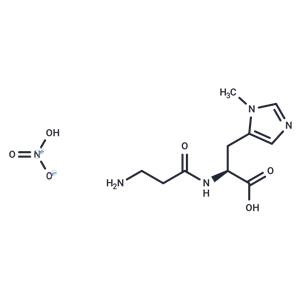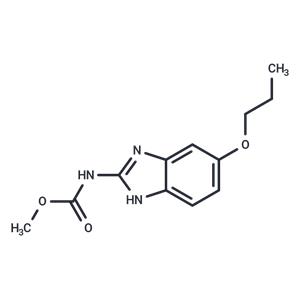
10058-F4 NEW
| Price | $43 | $68 | $109 |
| Package | 5mg | 10mg | 25mg |
| Min. Order: | |
| Supply Ability: | 10g |
| Update Time: | 2024-11-19 |
Product Details
| Product Name: 10058-F4 | CAS No.: 403811-55-2 |
| Purity: 99.82% | Supply Ability: 10g |
| Release date: 2024/11/19 |
Product Introduction
Bioactivity
| Name | 10058-F4 |
| Description | 10058-F4 (c-Myc Inhibitor) is a cell-permeable thiazolidinone that specifically inhibits the c-Myc-Max interaction and prevents transactivation of c-Myc target gene expression; induces cell-cycle arrest and apoptosis. |
| Cell Research | Cells, plated in 96-well plates (105/mL for cell lines and 5 × 105/mL for primary leukemic cells), are treated in triplicate with indicated concentrations of 10058-F4. At various time points, 20 μL 5 mg/mL MTT is added to each well. After incubation at 37°C for 3 hours, the MTT medium is removed and 100 μL DMSO lysis buffer is added. The number of viable cells is assessed by the percentage of absorbance of treated cells relative to that of solvent controls, using 570-nm wavelength on a spectrophotometer.(Only for Reference) |
| In vitro | 10058-F4 caused AML cells to arrest in the G0/G1 phase, resulting in the down-regulation of c-Myc expression and the up-regulation of CDK inhibitors p21 and p27. Meanwhile, 10058-F4 induced apoptosis by activating the mitochondrial pathway, which resulted in the down-regulation of Bcl-2, up-regulation of Bax, release of cytochrome C from the cytoplasm, and cleavage of caspase3/7/9. In addition, 10058-F4 may induce myeloid differentiation by activating various transcription factors. Similarly, 10058-F4 induced apoptosis and differentiation of primary AML cells. 10058-F4 reduced c-Myc protein levels and inhibited proliferation of HepG2 cells, which may be related to the up-regulation of p21WAF1, a cell cycle protein-dependent kinase inhibitor, and the reduction of intracellular [alpha]-methylated fetoprotein. 10058-F4 also down-regulated the transcriptional level of human telomerase and reverse transcriptase. 10058-F4 also down-regulated the transcriptional level of human telomerase. reverse transcriptase downregulation. In addition to inhibiting the proliferation of HepG2 cells, 10058-F4 enhanced their sensitivity to conventional chemotherapeutic agents, adriamycin, 5-fluorouracil and cisplatin. |
| In vivo | 10058-F4 caused AML cells to arrest in the G0/G1 phase, resulting in the down-regulation of c-Myc expression and the up-regulation of CDK inhibitors p21 and p27. Meanwhile, 10058-F4 induced apoptosis by activating the mitochondrial pathway, which resulted in the down-regulation of Bcl-2, up-regulation of Bax, release of cytochrome C from the cytoplasm, and cleavage of caspase3/7/9. In addition, 10058-F4 may induce myeloid differentiation by activating various transcription factors. Similarly, 10058-F4 induced apoptosis and differentiation of primary AML cells. 10058-F4 reduced c-Myc protein levels and inhibited proliferation of HepG2 cells, which may be related to the up-regulation of p21WAF1, a cell cycle protein-dependent kinase inhibitor, and the reduction of intracellular [alpha]-methylated fetoprotein. 10058-F4 also down-regulated the transcriptional level of human telomerase and reverse transcriptase. 10058-F4 also down-regulated the transcriptional level of human telomerase. reverse transcriptase downregulation. In addition to inhibiting the proliferation of HepG2 cells, 10058-F4 enhanced their sensitivity to conventional chemotherapeutic agents, adriamycin, 5-fluorouracil and cisplatin. |
| Storage | Powder: -20°C for 3 years | In solvent: -80°C for 1 year | Shipping with blue ice. |
| Solubility Information | H2O : < 1 mg/mL (insoluble or slightly soluble) DMSO : 65 mg/mL (260.68 mM) Ethanol : 5 mg/mL (20 mM) |
| Keywords | Myc | Autophagy | 10058F4 | c-Myc | inhibit | 10058-F-4 | 10058-F4 | Inhibitor | 10058 F4 |
| Inhibitors Related | Stavudine | Xylitol | Myricetin | Sodium 4-phenylbutyrate | Hydroxychloroquine | Guanidine hydrochloride | Taurine | Curcumin | Oxyresveratrol | Paeonol | Naringin | Gefitinib |
| Related Compound Libraries | Glycolysis Compound Library | Reprogramming Compound Library | Bioactive Compound Library | Autophagy Compound Library | Inhibitor Library | PPI Inhibitor Library | Bioactive Compounds Library Max | Covalent Inhibitor Library | Cell Cycle Compound Library | Wnt/Hedgehog/Notch Compound Library |
Company Profile Introduction
Target Molecule Corp. (TargetMol) is a global high-tech enterprise, headquartered in Boston, MA, specializing in chemical and biological research product and service to meet the research needs of global customers.
TargetMol has evolved into one of the biggest global compound library and small molecule suppliers and a customer based on 40+ countries. TargetMol offers over 80 types of compound libraries and a wide range of high-quality research chemicals including inhibitors, activator, natural compounds, peptides, inhibitory antibodies, and novel life-science kits, for laboratory and scientific use. Besides, virtual screening service is also available for customers who would like to conduct the computer-aided drug discovery.
You may like
Recommended supplier
| Product name | Price | Suppliers | Update time | |
|---|---|---|---|---|
| $0.00/5mg |
Shanghai Standard Technology Co., Ltd.
|
2020-04-02 | ||
| $99.00/1EA |
Amikon Limited
|
2018-06-22 |
- Since: 2011-01-07
- Address: 36?Washington?Street, Wellesley?Hills
INQUIRY







 United States
United States